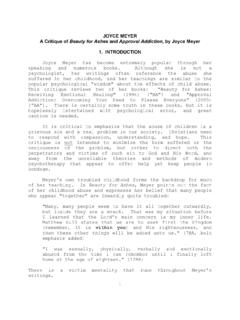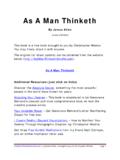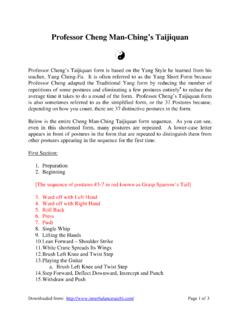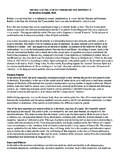Transcription of GOD'S DEFINITION OF MEANING A Critique of …
1 GOD'S DEFINITION OF MEANING A Critique of Man's Search for MEANING , by Victor frankl Nature of Biblical Man's Biblical Man's Biblical Change: Goals, Methods, Agent for Goals of Standards of Methods of Biblical Man's Response to Biblical 1 1 Critique OF VICTOR frankl 'S "LOGOTHERAPY" GOD'S DEFINITION OF MEANING Critique of Man's Search for MEANING , by Dr. Victor frankl Drawing on his horrendous experiences in a concentration camp under the Hitler regime, psychiatrist Victor frankl has developed a form of treatment he calls "logotherapy," in response to man's search for MEANING in life, particularly under conditions of intense suffering.
2 Unlike many of his colleagues, he does not display an open hostility toward Christianity. His writing reveals at least some belief in the existence of God, although he has not embraced the Christian faith and evidently prefers to separate his religious beliefs from his psychotherapy. Interestingly, frankl faintly recognizes that his profession has usurped the role of the pastor: "Some of the people who nowadays call on a psychiatrist would have seen a pastor, priest or rabbi in former days" (p. 138, emphasis added). The best way to evaluate his approach to man's problems is to look at some categories--categories which are also addressed by Scripture: What is the nature of man?
3 What is man's basic need? What is man's fundamental problem? How can that problem be solved? Who is the major agent for change? What is the goal of that change? NATURE OF MAN In general Victor frankl sees man as a free, self-determined agent who uniquely determines the MEANING of his own individual life, having the potential for either great good or great evil. He stresses man's responsibility for his own life: "things determine each other but man is ultimately self-determining" (p. 157). He asks, "How can we dare to predict the behavior of man?" (p. 155). Yet he cautions that " not the last word" (p. 155) but rather "is in danger of degenerating into mere arbitrariness unless it is lived in terms of responsibleness" (p.)
4 156). In contrast with many victim-oriented psychologists of today, frankl describes the danger of seeing man as "nothing but the result of biological, psychological, and sociological conditions, or the product of heredity and environment" (p. 153). He warns that "this neurotic fatalism is fostered and strengthened by a psychotherapy which denies that man is free" (p. 153). Departing from the behaviorists, frankl laments that for too many years, "psychiatry tried to interpret the human mind merely as a mechanism" (p. 156). Instead, he claims that "the innermost core of the patient's personality is not even touched by a 2 2psychosis".
5 "the incurable psychotic individual may lose his usefulness but yet retain the dignity of a human being" (p. 156). frankl sees the primary motivation of man as "the striving to find MEANING in one's life" (p. 121). This is not merely "a 'secondary rationalization' of instinctual drives" (p. 121), but the major driving force for man's actions. Later we will see how this presupposition forms the framework for his DEFINITION of man's basic need/problem, as well as his therapeutic methods. frankl believes that man has the potential to become either "swine or saint," depending not on external conditions but rather on the decisions of his own free will.
6 Drawing on his concentration camp experiences, he notes that: "Life in a concentration camp tore open the human soul and exposed its depths. Is it surprising that in those depths we again found only human qualities which in their very nature were a mixture of good and evil?" (p. 108) Biblical Response. We can agree with frankl that man has serious responsibilities and is not determined by his environment, experiences, or genetic factors. In that sense, he brings welcome relief from what many Freudian-oriented Christian psychologists today are teaching. Scripture clearly warns that man is "without excuse" (Romans 1:20). frankl 's system, however, does not see man as responsible before God, but only as responsible to himself.
7 There is no place in his system for absolute standards of value, as determined by God, to distinguish between good and evil. frankl carries man's free will far beyond the responsibilities outlined in Scripture. Even though man is responsible before God, the Bible repeatedly affirms GOD'S sovereign control over the affairs of man (Ephesians 1:11; Daniel 4:34, 35; Proverbs 19:21, 16:1, 16:4, 16:9, 20:24, 21:1, 21:30, 21:31; Romans 8:28, 29; Romans 9). Man does not have the ability, on his own, to become either "swine or saint." Scripture teaches that man's nature is sinful, and that left to his own devices he lives in rebellion against God (Isaiah 53:6, Romans 3:10-18).
8 He is spiritually dead in his sins, apart from GOD'S divine intervention to give him spiritual life (Ephesians 2:1, 8, 9). Our conclusion must be that frankl 's view of man, though containing elements of truth, is biblically inadequate. 3 3 MAN'S NEED frankl claims that "man's search for MEANING may arouse inner tension rather than inner equilibrium," but "precisely such tension is an indispensable prerequisite of mental health" (p. 126). "What man actually needs is not a tensionless state but rather the striving and struggling for a worthwhile goal, a freely chosen task" (p. 127). Such sentiments are echoed by many other psychologists, using such phrases as "hunger for significance.
9 " Biblical Response. Man was created to live in close fellowship with God, to reflect His image and thus glorify Him. Because man has exchanged the glory and worship of God to seek after his own glory, and to worship idols (Romans 1:18-32), his primary need is for reconciliation with God. He is unable to achieve this through his own efforts, and thus his most fundamental need is for the redemption that Christ accomplished on the cross. MAN'S PROBLEM Having begun with man's need for MEANING , frankl states that "man's will to MEANING can also be frustrated" (p. 123). "A man's concern, even his despair, over the worthwhileness of life is an existential distress but by no means a mental disease" (p.)
10 125). Elsewhere frankl proposes that an "existential vacuum" exists because "at the beginning of human history, man lost some of the basic animal instincts in which an animal's behavior is imbedded and by which it is secured" (p. 128). A second loss to man is that "the traditions which buttressed him are now rapidly diminishing" (p. 128). This problem of boredom results in "more problems to solve than distress" (p. 129). A frustration of man's will to MEANING may be "vicariously compensated for" either by a "will to power" or a "will to pleasure" or some other substitute (p. 129). Biblical Response. We can agree that the term "mental disease" is inappropriate to describe man's basic problem.









